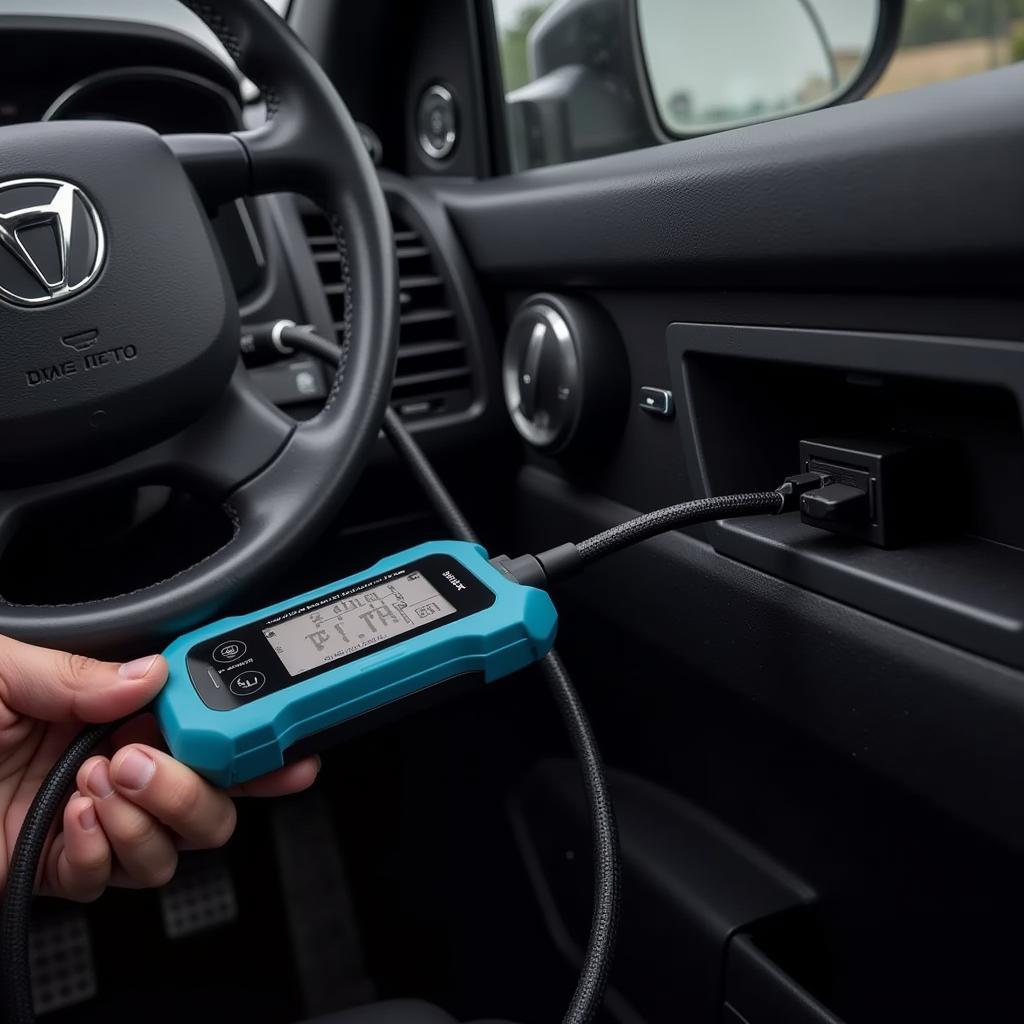In the realm of automotive repair and maintenance, having the right tools can make all the difference. Car diagnostic plug in tools have become essential for mechanics and car enthusiasts alike, providing a window into the complex world of vehicle electronics. These tools empower users to diagnose issues, pinpoint faults, and get their vehicles back on the road quickly and efficiently.
What is a Car Diagnostic Plug In Tool?
A car diagnostic plug in tool, also known as an OBD2 scanner, is a device that connects to your vehicle’s onboard diagnostic system (OBD) port. This port, typically located under the dashboard on the driver’s side, acts as a communication gateway to the car’s computer system.
 Car Diagnostic Tool Connected
Car Diagnostic Tool Connected
Once connected, the diagnostic tool can read and interpret diagnostic trouble codes (DTCs) stored in the vehicle’s computer. These codes provide valuable insights into the health of various systems, including the engine, transmission, airbags, and emissions control.
Types of Car Diagnostic Plug In Tools
The market offers a wide range of car diagnostic plug in tools, catering to diverse needs and budgets. These tools can be broadly categorized as:
-
Basic Code Readers: These entry-level tools primarily focus on reading and clearing DTCs. They are ideal for car owners who want to get a general understanding of their vehicle’s health and address basic issues.
-
Advanced Scanners: Designed for professional mechanics and experienced DIYers, these tools provide more comprehensive diagnostic capabilities. They offer live data streaming, allowing users to monitor various engine parameters in real-time, such as RPM, coolant temperature, and oxygen sensor readings.
-
Manufacturer-Specific Tools: Some car manufacturers offer specialized diagnostic tools designed specifically for their vehicle models. These tools provide access to proprietary systems and data, enabling more in-depth diagnostics and troubleshooting.
Benefits of Using Car Diagnostic Plug In Tools
Investing in a car diagnostic plug in tool offers numerous benefits:
- Early Problem Detection: By regularly scanning your vehicle, you can identify potential issues before they escalate into major problems, saving you time, money, and potential headaches down the road.
- Accurate Diagnostics: These tools provide accurate and detailed diagnostic information, eliminating guesswork and ensuring that you address the root cause of the problem.
- Cost Savings: By identifying issues early on, you can avoid unnecessary repairs and costly trips to the mechanic.
- DIY Empowerment: Car diagnostic plug in tools empower car owners to take control of their vehicle’s maintenance and repairs.
- Enhanced Resale Value: Maintaining a detailed service history, including diagnostic reports, can enhance the resale value of your vehicle.
Choosing the Right Car Diagnostic Plug In Tool
With a plethora of options available, selecting the right car diagnostic plug in tool can seem daunting. Here are key factors to consider:
- Vehicle Compatibility: Ensure the tool is compatible with your vehicle’s make, model, and year. Some tools are designed for specific car brands, while others offer broader compatibility.
- Functionality: Determine the level of diagnostic capability you require. Basic code readers are sufficient for casual users, while advanced scanners are more suitable for professionals or experienced DIY enthusiasts.
- Features: Consider features like live data streaming, graphing capabilities, and support for manufacturer-specific protocols.
- User Interface: Opt for a tool with an intuitive user interface and easy-to-understand menus and displays.
- Budget: Set a budget beforehand and explore tools within your price range. Remember that more advanced features often come at a higher cost.
Conclusion
Car diagnostic plug in tools have revolutionized the way we diagnose and repair vehicles. These powerful tools provide valuable insights into the inner workings of our cars, empowering us to address issues efficiently and effectively. Whether you’re a professional mechanic or a car enthusiast, investing in a reliable car diagnostic plug in tool is a wise decision that can save you time, money, and frustration in the long run.
FAQs
Q: Can I use any car diagnostic plug in tool on my vehicle?
A: No, not all car diagnostic plug in tools are compatible with all vehicles. Ensure that the tool you choose is compatible with your vehicle’s make, model, and year.
Q: Can a car diagnostic plug in tool fix my car?
A: While car diagnostic plug in tools can identify problems, they cannot fix them. They provide valuable information to help you determine the necessary repairs.
Q: How often should I scan my car with a diagnostic tool?
A: It’s generally recommended to scan your vehicle for diagnostic trouble codes at least once a year or whenever you experience unusual performance issues.
Q: Can I use a car diagnostic plug in tool to reset my check engine light?
A: Yes, most car diagnostic plug in tools allow you to clear diagnostic trouble codes and reset the check engine light. However, it’s crucial to address the underlying issue that triggered the light in the first place.
Q: Are car diagnostic plug in tools difficult to use?
A: Many car diagnostic plug in tools feature user-friendly interfaces and intuitive menus, making them relatively easy to use even for beginners.
For personalized assistance in choosing the right car diagnostic plug in tool or for expert advice on any automotive diagnostic needs, feel free to reach out to us. Contact our team of specialists via WhatsApp: +1(641)206-8880, Email: [email protected]. We offer 24/7 customer support to address all your queries.
Don’t forget to check out our related articles on plug in car diagnostic tools and diagnostic car scanner kit for a comprehensive understanding of car diagnostic equipment.

